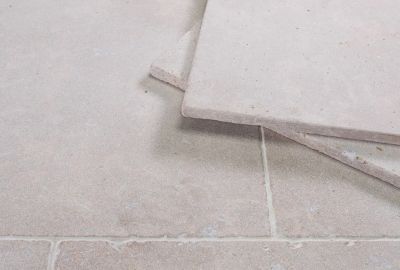When it comes to using natural stone tiles in your home, it’s hard to go wrong with solid limestone tiles. Strong and durable, limestone has been used in homes for decades, but has seen a surge in popularity in recent years.
And while there are other material options out there, if you do decide to go with limestone over other natural stone or porcelain tile options, the next question is which type you’re going to choose for your tiling project.
So, to help you answer that question, we’re going to break down exactly what Dijon limestone is, its main advantages and disadvantages compared to other limestone types, and how it compares to Jaipur and Jura limestone.
What is Dijon limestone?
Originally hailing from the quarries around the French city of Dijon, Dijon limestone holds many of the classic characteristics found in other limestone types that give this style of natural stone tile its distinct colours and patterns.
A sedimentary rock, Dijon limestone is formed from a combination of compressed fossils and minerals which have been exposed to extreme pressure over millions of years. However, with Dijon limestone, these fossil and calcite vein patterns are much more visible and distinct due to its naturally pale colour.
In fact, neutral is the name of the game when it comes to Dijon stone. Most commonly coming in soft and pale beiges, its antiqued surface and worn edges make it look as though it's been worn over many years, especially if you choose a tumbled Dijon limestone.
What are the advantages and disadvantages of Dijon limestone?
Much like other types of limestone, Dijon limestone comes with a number of advantages and disadvantages that will decide whether or not it is a suitable tiling choice for your home’s needs.
The advantages of Dijon limestone
Here are the reasons to consider Dijon limestone for your next tiling project:
- Long-lasting: A highly durable stone that’s ideal for high-traffic spaces around the home.
- Versatile: A pale colour palette that makes it the perfect flooring option for rooms that you want to feel bigger.
- Low-maintenance: As it is a natural stone, scratches and stains can be sanded out of the tiles without the risk of damaging its aesthetic.
The disadvantes of Dijon limestone
Meanwhile, it’s also important to be aware of the drawbacks to Dijon limestone:
- Can be tricky to handle: Due to its heavy density, Dijon limestone can be tricky to lay properly without assistance.
- Requires regular resealing: As with all limestone, Dijon limestone is naturally porous, meaning you will need to regularly seal it in order to protect your floors against erosion and staining. If you’re curious about the other benefits and disadvantages of this type of tile, be sure to read our guide to limestone.
Why choose Dijon limestone?
Unlike Jaipur and Jura limestone, Dijon limestone offers a classically European and English aesthetic, making it a suitable material choice for any traditional English home, barn conversion, or even as an external patio for anyone wanting to lend a Victorian feeling to their garden.
Dijon is an ideal choice for kitchens in particular, as its lighter colouration makes it easy to spot stains, while its hard-wearing nature can handle the constant hustle and bustle of family life.
And, in general, Dijon limestone is an excellent choice for anyone who wants a neutral floor that will go well with any shade selection, and seen as Jaipur limestone is naturally orange and Jura limestone more grey in tone, Dijon lends itself well to this role.
And there you have it, now you know what Dijon limestone is, and how it differs from the other types of limestone. Of course, if you have any more questions regarding this type of limestone, feel free to get in touch with our team of experts today.
And for even more from our experts, don’t forget that you can also browse the rest of our guides to choosing tiles.


